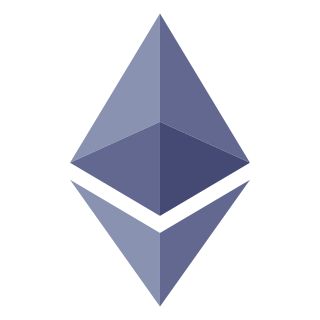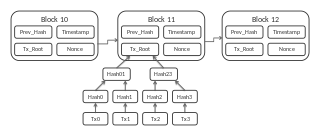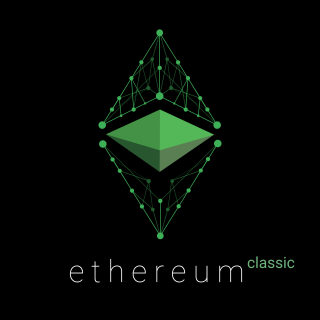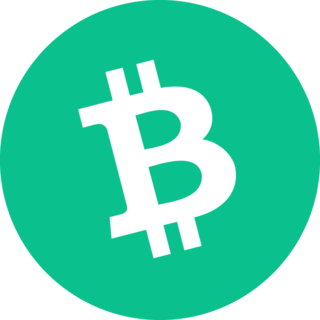
eToro is a social trading and multi-asset brokerage company that focuses on providing financial and copy trading services. It has registered offices in Cyprus, Israel, the United Kingdom, the United States, and Australia. In 2018, the company’s value was $800 million.
Bitcoin (₿) is a cryptocurrency invented in 2008 by an unknown person or group of people using the name Satoshi Nakamoto and started in 2009 when its implementation was released as open-source software.

A cryptocurrency is a digital asset designed to work as a medium of exchange wherein individual coin ownership records are stored in a ledger existing in a form of computerized database using strong cryptography to secure transaction records, to control the creation of additional coins, and to verify the transfer of coin ownership. It typically does not exist in physical form and is typically not issued by a central authority. Cryptocurrencies typically use decentralized control as opposed to centralized digital currency and central banking systems. When a cryptocurrency is minted or created prior to issuance or issued by a single issuer, it is generally considered centralized. When implemented with decentralized control, each cryptocurrency works through distributed ledger technology, typically a blockchain, that serves as a public financial transaction database.
Coinbase is a digital currency exchange headquartered in San Francisco, California, United States. They broker exchanges of Bitcoin, Bitcoin Cash, Ethereum, Ethereum Classic, Litecoin, Tezos, and many others, with fiat currencies in approximately 32 countries, and bitcoin transactions and storage in 190 countries worldwide.

Dogecoin is a cryptocurrency featuring a likeness of the Shiba Inu dog from the "Doge" Internet meme as its logo. Introduced as a "joke currency" on 6 December 2013, Dogecoin quickly developed its own online community and reached a capitalization of US$60 million in January 2014.
Blockchain.com is a Bitcoin block explorer service, as well as a cryptocurrency wallet and a cryptocurrency exchange supporting Bitcoin, Bitcoin Cash, and Ethereum. They also provide Bitcoin data charts, stats, and market information.

Ethereum is the second-largest cryptocurrency platform by market capitalization, behind Bitcoin. It is a decentralized open source blockchain featuring smart contract functionality. Ether (ETH) is the cryptocurrency generated by Ethereum miners as a reward for computations performed to secure and add blocks to the blockchain. Ethereum serves as the platform for over 1,900 different cryptocurrencies and tokens, including 47 of the top 100 cryptocurrencies by market capitalization.

Dash is an open source cryptocurrency. It is an altcoin that was forked from the Bitcoin protocol. It is also a decentralized autonomous organization (DAO) run by a subset of its users, which are called "masternodes". The currency permits transactions that can be untraceable.

A blockchain, originally block chain, is a growing list of records, called blocks, that are linked using cryptography. Each block contains a cryptographic hash of the previous block, a timestamp, and transaction data.
Huobi is a Singapore-based cryptocurrency exchange. Founded in China, the company now has offices in Hong Kong, Korea, Japan and the United States. In August 2018 it became a publicly listed Hong Kong company.
Monero is an open-source cryptocurrency created in April 2014 that focuses on fungibility, privacy and decentralization. Monero uses an obfuscated public ledger, meaning anybody can broadcast or send transactions, but no outside observer can tell the source, amount or destination. Monero uses a Proof of Work mechanism to issue new coins and incentivize miners to secure the network and validate transactions.

Ethereum Classic is an open source, blockchain-based distributed computing platform featuring smart contract (scripting) functionality. It supports a modified version of Nakamoto consensus via transaction-based state transitions executed on a public Ethereum Virtual Machine (EVM).

Zcoin is a cryptocurrency aimed at using cryptography to provide better privacy for its users compared to other cryptocurrencies such as Bitcoin.
Abra is a financial services and technology company that operates an all-in-one cryptocurrency wallet and exchange app. The Abra app is available on both iOS and Android platforms and allows users to deposit, withdraw, exchange, and hold 4 native coins, which includes Bitcoin, Bitcoin Cash, Ethereum, and Litecoin in one place. In addition to this, Abra supports a multitude of cryptocurrency assets, allowing users to exchange and hold over 50 cryptocurrencies excluding the aforementioned native coins.

Bitcoin Cash is a cryptocurrency that is a fork of Bitcoin. Bitcoin Cash is a spin-off or altcoin that was created in 2017. In 2018 Bitcoin Cash subsequently split into two cryptocurrencies: Bitcoin Cash and Bitcoin SV. Bitcoin Cash is sometimes also referred to as Bcash.

Bitcoin Gold (BTG) is a cryptocurrency. It is a hard fork of Bitcoin, the open source cryptocurrency. It is an open source, decentralized digital currency without a central bank or intermediary that can be sent from user to user on the peer-to-peer Bitcoin Gold network.
Binance is a cryptocurrency exchange that provides a platform for trading various cryptocurrencies. As of January 2018, Binance was the largest cryptocurrency exchange in the world in terms of trading volume.

Charles Lee is a computer scientist, best known as the creator of Litecoin. He serves as the managing director of the Litecoin Foundation. As of July 2013, he also worked for Coinbase.
Bancor Protocol is a standard for decentralized exchange networks used to allow for the automated conversion of cryptocurrency tokens into other tokens, including across blockchains, without the need for an order book or counterparty to facilitate the exchange. Bancor invented the world’s first blockchain-based automated liquidity pool, or automated market maker (AMM) called a Smart Token, a digital currency with an embedded converter that allows it to be issued or exchanged automatically for any token in its network. Bancor Network consists of all the different tokens utilizing the Bancor Protocol and connected through BNT, the Bancor Network Token, which serves as the hub token for the network through which any token can be converted into any other token.










